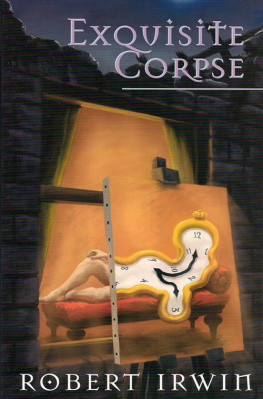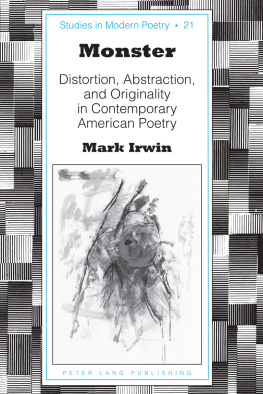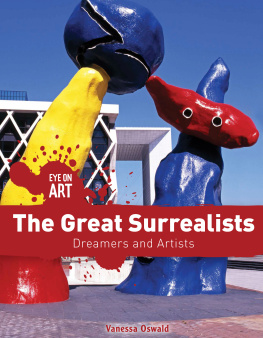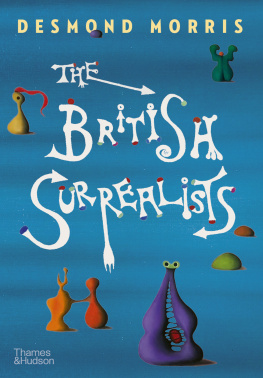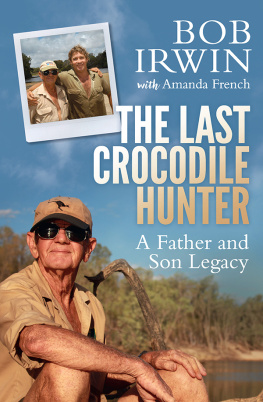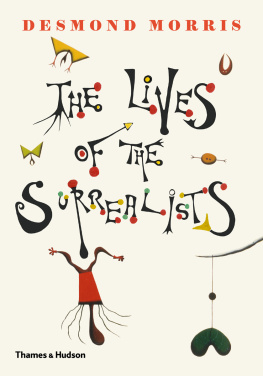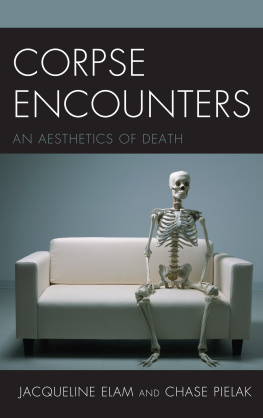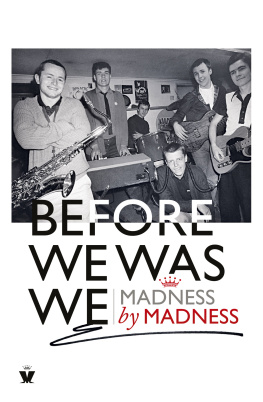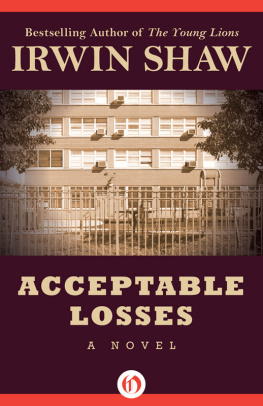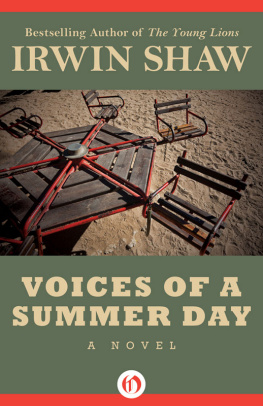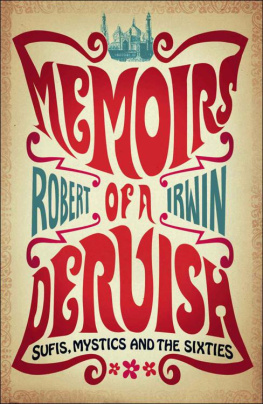Irwin - Exquisite Corpse
Here you can read online Irwin - Exquisite Corpse full text of the book (entire story) in english for free. Download pdf and epub, get meaning, cover and reviews about this ebook. City: Cambs;Europe, year: 2011, publisher: Dedalus, genre: Science fiction. Description of the work, (preface) as well as reviews are available. Best literature library LitArk.com created for fans of good reading and offers a wide selection of genres:
Romance novel
Science fiction
Adventure
Detective
Science
History
Home and family
Prose
Art
Politics
Computer
Non-fiction
Religion
Business
Children
Humor
Choose a favorite category and find really read worthwhile books. Enjoy immersion in the world of imagination, feel the emotions of the characters or learn something new for yourself, make an fascinating discovery.
- Book:Exquisite Corpse
- Author:
- Publisher:Dedalus
- Genre:
- Year:2011
- City:Cambs;Europe
- Rating:3 / 5
- Favourites:Add to favourites
- Your mark:
- 60
- 1
- 2
- 3
- 4
- 5
Exquisite Corpse: summary, description and annotation
We offer to read an annotation, description, summary or preface (depends on what the author of the book "Exquisite Corpse" wrote himself). If you haven't found the necessary information about the book — write in the comments, we will try to find it.
Exquisite Corpse — read online for free the complete book (whole text) full work
Below is the text of the book, divided by pages. System saving the place of the last page read, allows you to conveniently read the book "Exquisite Corpse" online for free, without having to search again every time where you left off. Put a bookmark, and you can go to the page where you finished reading at any time.
Font size:
Interval:
Bookmark:
Robert Irwin

For Oliver Sorge who taught me all I know about writing.
Authors note to the second edition
Books have their destinies. The first edition of this memoire, or rather it should be anti-memoire, was published only last year. What need for a second edition so soon after the first? The answer is that within a few months of the publication of Exquisite Corpse and in response to its publication certain things happened which forced me to re-examine the events it described and to look on them in a new light. When I look back at what I first wrote, I laugh, though really I should weep. I thought that I could look back on the past as if through a window, but what I was actually looking at was only a painting of a window Illusions of the heart and the eye When I was last in Brussels, Ren Magritte showed me one of his early paintings, Human Condition I, in which we see a picture on an easel standing in front of a landscape and obscuring part of that landscape. The picture itself shows a landscape, but it is doubtful whether the landscape it shows is really the same as the one it obscures. I have only recently become aware that the version of the past which I present in this book is somewhat like Magrittes puzzle painting. I now have a very different idea of what happened so many years ago and would not now write what I have written here. Neither the manner nor the content would be the same. Nevertheless, I have not changed a single word of the text. Only I have added an additional chapter at the end, a chapter which changes the meaning of everything which comes before. Now it occurs to me to wonder if, in a year or twos time, I may not be drafting a prefatory note to a third revised and expanded edition I hope not. There has to be an end to all this.
London, December, 1952.
I rarely dream of Caroline. However, I dreamt last night that we were walking round Battersea Funfair. She wanted to be a milkmaid. I promised her a miniature Trianon. Then I was on my knees before her. She was impatient to go back to her office, but she condescended to feed me coughdrops.
Where is Caroline? Where has everyone gone? I walk up and down the old familiar streets of Soho and Bloomsbury without encountering anyone. And not just Soho and Bloomsbury, for I venture further to Ealing, St Albans and the Faubourg St Germain but the streets are always empty, empty save for the regiments of City men in bowler hats and suits, of spivs and street traders in trilbies and demob suits and the soldiers and sailors on leave. But these are dead people. Only the women seem alive. My eyes are always on the women, looking for Caroline, or if not Caroline, then for some other woman, in the hope that studying her may help me to understand Caroline better.
No Caroline. No Ned Shillings. No Oliver Sorge. No Jenny Bodkin. No Mackellar. No Felix. No Jorge. Even Pamela, who used to draw hundreds nightly to hear her sing, has vanished. Where have they all gone? While my back was turned, did they enter into a secret pact to sign up as lighthouse-keepers, nuns or foreign legionaries? It may be that they have settled down in quiet suburbs and have found employment and contentment as town clerks, insurance salesmen, jobbing decorators and so on, but that is hard to believe.
I have a photograph of some of the group in front of me now. It was taken in 1936, a couple of months after the Surrealist Exhibition at the New Burlington Galleries closed. We are assembled outside Winkelmanns Gallery, just off Regent Street, all squinting into the sun, all save Ned, who from the centre of the group gazes fearlessly into the camera. The brilliant whites of his eyes always used to make me think of a raptor. Most of us are smiling sheepishly. Jenny Bodkin in her striped sailors shirt is brandishing that preposterous glove puppet of hers, the one shaped like a voracious, cunt fringed with pubic hair. Jorge, kneeling in front of us, wrestles unconvincingly with a concertina. Glasses and cigarettes are much in evidence and some of the glasses are raised in the direction of Ned, whose show this is. Felix sits at his feet and lets an exploring hand stray mischievously up his trouser-leg towards his groin.
I am on the edge of the group in the shadow of the Gallerys awning. Looking at myself now, I know that I was preoccupied that day. I wanted to talk Winkelmann into agreeing to an exhibition of my illustrations to Mackellars The Girlhood of Gagool. I never had much chance of that. Oliver has one arm flung round my shoulders while with the other he cradles Monica. Caroline does not appear in the photograph. La femme trouve, she was never regarded as part of our group. But she was the one who took the picture. Later, much later, after the war, I used this, her photograph, as the basis for a retrospective portrait of the group. I changed nothing except that I painted everyone with their eyes tightly closed, so that they appear to sleep, propping each other up in a collective dream. In this version, it is only I who is awake and who stares wide-eyed out of the canvas. The painting has passed into the hands of the National Portrait Gallery and I believe they keep it stored in some basement as part of their reserve collection.
There were about twenty or thirty of us, members of the Serapion Brotherhood, plus hangers-on and admirers. In the years before the outbreak of the War, I could walk into the Dead Rat Club on any night and find half a dozen of them at least. It was even unusual to walk any distance in central London without encountering one or other by chance. Indeed, it seems to me that chance operated differently before the War. We in the Brotherhood were so sure that we would change the face of art, literature, politics, everything. Now Sohos bars and clubs are full of new men and women, who seem yet noisier, drunker and more confident: Maclaren-Ross; Tambimuttu, Colquhoun, MacBryde, Dylan Thomas, Nina Hamnett. The old gang have vanished very nearly without trace. I run into Paul Nash and David Gascoyne occasionally. I spotted one of Jenny Bodkins toys in a shop window a couple of weeks ago. It was the teddy bear with the hammer, who growls Put me down when he is picked up. At least I know about Ned Shillings. He is dead, as he promised he would be. Herbert Read and I still correspond, though with increasing acrimony. I read everything that Oliver Sorge has published in Horizon and elsewhere, but I have no idea where he lives and letters sent to Cyril Connolly for forwarding go unanswered. Cyril himself swears he does not know where Oliver lives now.
Oliver Sorge, Paul Nash, Jorge Arguelles, Herbert Read. Now it occurs to me that all these names and indeed my own name may give rise in the reader to false expectations as to what this book is about. This is not a history of the Serapion Brotherhood. Nor is it in any sense an autobiography, for I loathe being bored to death with the details of an autobiographers parents, grandparents and great-grandparents, and then by an account of his (probably unhappy) days at school, to be followed by a lyrical evocation of spreading wings at university and so on, and so on. All that I hate. I have kept no diaries which might serve as the basis for an autobiography, but only a noctuary in which I record the little which has happened to me while I am asleep. If you are curious about my parentage, know then that Lautramont was my father and Alice in Wonderland my mother. As for my infancy, I am still in it. In my studies the whisky bottle has served me as a microscope and the brothel has been my laboratory.
Next pageFont size:
Interval:
Bookmark:
Similar books «Exquisite Corpse»
Look at similar books to Exquisite Corpse. We have selected literature similar in name and meaning in the hope of providing readers with more options to find new, interesting, not yet read works.
Discussion, reviews of the book Exquisite Corpse and just readers' own opinions. Leave your comments, write what you think about the work, its meaning or the main characters. Specify what exactly you liked and what you didn't like, and why you think so.

